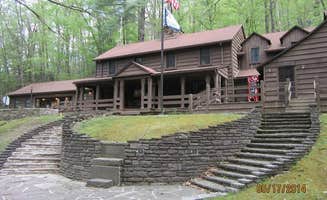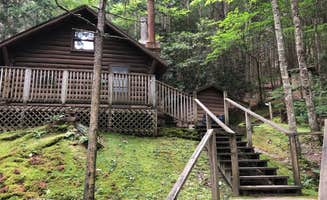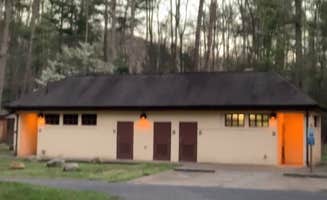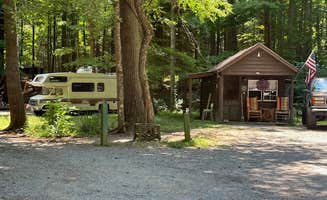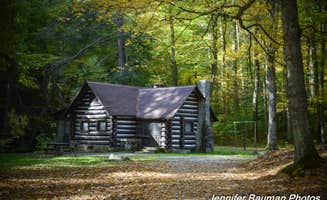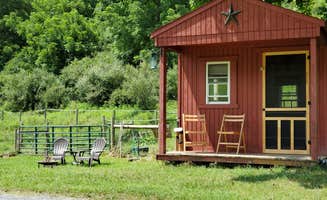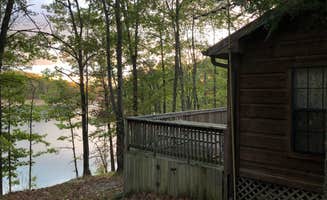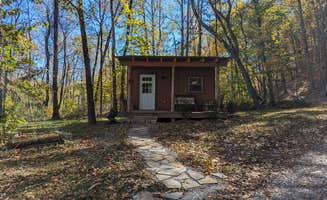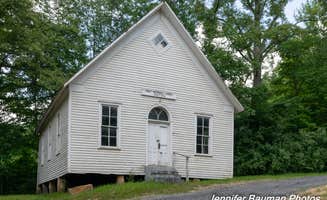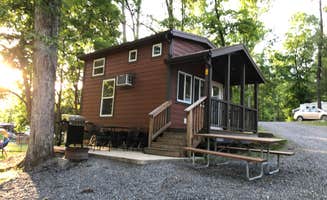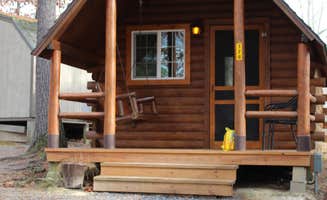Cabins near Buckeye, West Virginia provide access to the Monongahela National Forest at elevations ranging from 2,300-4,000 feet, creating distinct seasonal camping conditions. Summer temperatures average 70-80°F during day and 50-60°F at night, while spring and fall can see temperature swings of 30-40 degrees within 24 hours. Nearby Watoga State Park sits on 10,100 acres with multiple cabin options ranging from rustic to modern accommodations.
What to do
Kayaking on Greenbrier River: Riverside Campground at Watoga State Park offers direct river access for paddlers. "The Greenbrier River was right at the back of our site. People were floating and fishing and paddling. The Greenbrier River Trail, an 80 mile long rail trail is just across the river, accessible two miles from the park, we rode our bikes to the trail," notes one visitor.
Biking the rail trails: The Greenbrier River Trail provides 80 miles of relatively flat terrain. "We camped at site 4 (non-electric) July 28-31, 2020... Short drive or hike to Lake with boat rentals and fishing," explains a Seneca State Forest camper who enjoyed nearby recreation options.
Wildlife viewing: Early mornings and dusk provide the best opportunities. "Encountered 19 deer, 1 bear, and several other small creatures," reported one Seneca visitor who stayed in a non-electric site. At Riverside Campground, campers frequently spot deer along hiking trails near the water's edge.
Fishing opportunities: Stocked waters provide reliable catches. "The lake is nice, and there is nice hiking along the shore," reports a Douthat visitor. The nearby Greenbrier and other mountain streams offer trout fishing, particularly after spring stocking.
What campers like
Fire tower experience: Thorny Mountain Fire Tower at Seneca State Forest offers a unique overnight option. "Renting and staying in the Thorny Mountain Fire Tower is a special opportunity... Nearly 70 steps up the structure brings you to 3507 ft (by my GPS). From that height, you get to enjoy long mountain views in both West Virginia and Virginia," shares one visitor.
Pioneer cabin experience: Rustic accommodations without electricity provide an authentic experience. "We stayed in a cabin this time. One of the pioneer cabins. Let me say it was awesome, wood stove, gas light, outhouse and had to get your own water. The cabin was well put together and the staff has you set up to enjoy your stay with everything from soap to cut wood," says a visitor to Seneca State Forest.
Private sites: Greenbrier State Forest offers well-spaced camping areas. "The sites are well-appointed, well-maintained, wooded, and peaceful... each campsite even has its own trashcan with daily trash pick up," notes one camper. Another adds, "Semi-private campsites with water and electric. They are very large sites and have lots of trees."
Swimming options: Mountain lakes offer refreshing alternatives to pool swimming. "Lake swimming was fun (something I am not used to since I am from Florida)," says a visitor to Mountain Lake Campground. At Douthat State Park, the beach area provides designated swimming zones with sandy entry points.
What you should know
Limited connectivity: Most forest cabins lack cellular service and internet. "There is no cell service within 30 miles, so for an outsider who doesn't know the area, it was difficult to find the campsite," notes a Seneca State Forest visitor. At Riverside Campground, one review mentions, "It's in a valley, so there's no cell service. The wash houses have wi-fi, but it's not great."
Weather preparedness: Mountain elevations create variable conditions. "It rained every day but two, on our month of camping, so we were not dissuaded. I do recommend bringing additional tarps to cover any and everything you desire to stay remotely dry," advises a Holly River State Park camper.
Advance planning for supplies: Remote cabin locations require bringing essentials. "You also better bring everything you need beforehand. There are no grocery stores anywhere near the campsite and we didn't have any food with us," cautions a Seneca camper. Most cabin areas have limited or no nearby shopping options.
Road access challenges: Mountain roads can be difficult, especially for larger vehicles. "Caution should be used with large rigs as the low-water bridge to White Oak has steep approach and departure angles," warns a Douthat State Park visitor. Another notes, "The last couple miles of road getting here are rough...if you have an SUV you should be fine but I have a sportier suspension and it was not fun."
Tips for camping with families
Playground proximity: Select sites near recreational amenities. "Our camp site was right next to one of the playgrounds and that was definitely a plus! Our little boy could play while we watched from our site," shares a Mountain Lake Campground visitor who enjoyed the convenience of supervised play.
Educational opportunities: Watoga State Park's nature center offers structured activities. "Hiking, and Arboretum trail, so much to do. Cranberry Wilderness is less than 30 mins away. Great hiking, the best Visitor's center, with the nicest folks," notes a Riverside Campground visitor.
Safe swimming spots: Designated beach areas provide monitored swimming. "Lakeside Campground is smaller but the front row sites provide great lake views. Unfortunately swimming is only allowed in the Beach area which is not directly connected to this campground," explains a Douthat State Park camper.
Multi-generational activities: Find cabins with various difficulty trails nearby. "The trails are wonderful throughout the park if you enjoy hiking as we do," reports a Babcock visitor. Another camper notes, "Island-In-the-Sky is a great climb through a tunnel of rhododendron that eventually winds up and around a rock shelf. To get to the top you have to climb up a couple ladders and over rocks."
Tips from RVers
Site selection for larger rigs: Choose campgrounds with appropriate spaces. "Whispering Pines is a few miles away along the entry road and has a different character. It's a very flat and wide-open campground perfect for big RVs with much larger sites," notes a Babcock State Park visitor describing the various camping areas.
Hookup limitations: Many forest cabins and campgrounds have partial hookups only. "Electric-only hookups, and no dump station on site. Water is available a short distance from the campsites," reports a Greenbrier State Forest camper. Another notes, "For the nearly $30/night charge, this would become FAR too expensive and I'm not likely to stay here again simply because of the fear that the campground's silly rule might be enforced the next time."
Leveling challenges: Mountain sites often require additional equipment. "The sites are of good size. I stayed at the Beaver Creek Campgrounds," explains a Watoga camper. Another mentions, "Some spots are a little tight for bigger camper we have a 30' but we were okay."


